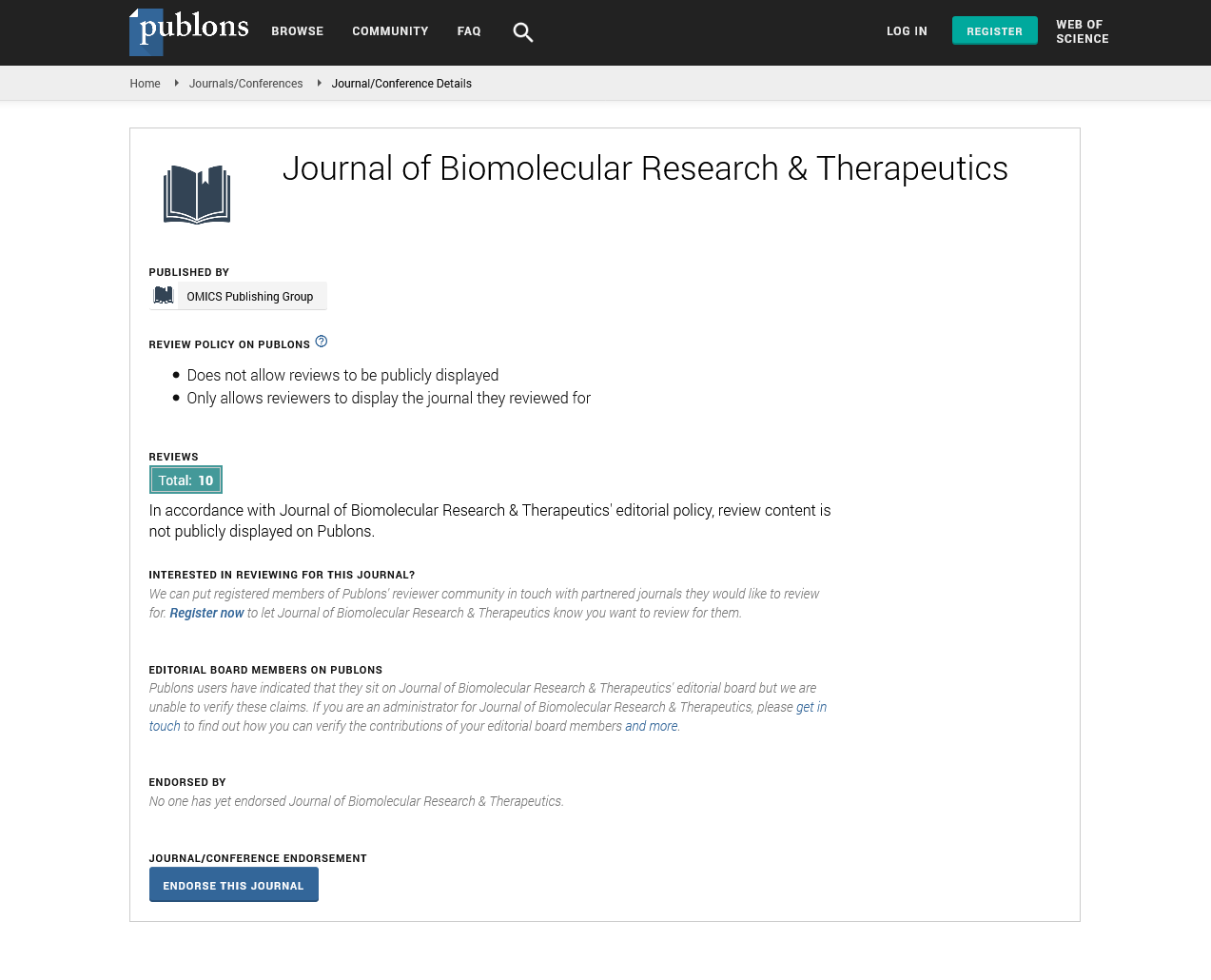Indexed In
- Open J Gate
- Genamics JournalSeek
- ResearchBible
- Electronic Journals Library
- RefSeek
- Hamdard University
- EBSCO A-Z
- OCLC- WorldCat
- SWB online catalog
- Virtual Library of Biology (vifabio)
- Publons
- Euro Pub
- Google Scholar
Useful Links
Share This Page
Journal Flyer

Open Access Journals
- Agri and Aquaculture
- Biochemistry
- Bioinformatics & Systems Biology
- Business & Management
- Chemistry
- Clinical Sciences
- Engineering
- Food & Nutrition
- General Science
- Genetics & Molecular Biology
- Immunology & Microbiology
- Medical Sciences
- Neuroscience & Psychology
- Nursing & Health Care
- Pharmaceutical Sciences
Commentary - (2023) Volume 12, Issue 5
The Role of Proteins, Nucleic Acids and Biomolecules in Cancer Therapy
Jonas Timo*Received: 10-May-2023, Manuscript No. BOM-23-21510; Editor assigned: 15-May-2023, Pre QC No. BOM-23-21510(PQ); Reviewed: 29-May-2023, QC No. BOM-23-21510; Revised: 06-Jun-2023, Manuscript No. BOM-23-21510(R); Published: 13-Jun-2023, DOI: 10.35248/2167-7956.23.12.296
Description
Cancer therapy is a rapidly evolving field that aims to medicate and eradicate cancer through various therapeutic approaches. Biomolecules have emerged as essential components in cancer therapy, playing critical roles as targets for drug development, diagnostic markers and therapeutic agents themselves. It explores different classes of biomolecules, including proteins, nucleic acids, lipids and carbohydrates and discusses their involvement in cancer therapy. Additionally the challenges and future prospects in utilizing biomolecules for cancer treatment are examined. Cancer is a complex and heterogeneous disease characterized by uncontrolled cell growth and the ability to invade surrounding tissues. It is a major global health concern and the development of effective cancer therapies remains a significant challenge. Biomolecules, such as proteins, nucleic acids, lipids and carbohydrates have gained considerable attention in cancer therapy due to their unique properties and potential for targeted interventions. These biomolecules offer diverse opportunities for therapeutic targeting early detection monitoring treatment response and personalized medicine.
Proteins play crucial roles in cancer initiation, progression and metastasis. Enzymes growth factors, receptors and signaling molecules are among the many protein targets that can be exploited for cancer therapy. Various strategies such as monoclonal antibodies small molecule inhibitors and immune checkpoint inhibitors have been developed to target these proteins and disrupt cancer-promoting pathways. Additionally, nucleic acids including DNA and RNA provide valuable targets for cancer therapy. Techniques like gene therapy, antisense oligonucleotides and small interfering RNA (siRNA) enable the modulation of gene expression and regulation of cancer-related genes. Lipids and carbohydrates are also being explored as targets for cancer therapy with potential applications in lipid metabolism modulation, glycoengineering, and immunotherapy.
Biomolecules serve as important diagnostic markers for cancer detection, classification and monitoring of treatment response. Proteins, such as tumor markers circulating tumor cells and specific protein signatures are used in various diagnostic techniques including immunoassays and liquid biopsies. Nucleic acids, especially DNA and RNA, provide valuable genetic information that can aid in cancer diagnosis and prognosis. Techniques like next-generation sequencing and Polymerase Chain Reaction (PCR) enable the detection of genetic alterations and gene expression patterns associated with specific cancers. Lipids and carbohydrates are also being investigated as potential diagnostic markers and imaging agents to enhance cancer detection and localization. Biomolecules themselves can act as therapeutic agents in cancer therapy. Protein-based therapeutics such as monoclonal antibodies have revolutionized cancer treatment by specifically targeting cancer cells or immune checkpoints, leading to enhanced immune response against tumors. Additionally nucleic acid-based therapeutics including gene therapy antisense oligonucleotides and RNA interference offer promising avenues for cancer treatment by modulating gene expression, inhibiting specific oncogenic targets or inducing cell death.
Lipid-based therapeutics, such as liposomes and lipid nanoparticles are utilized for targeted drug delivery and improving the pharmacokinetics of anticancer agents. While biomolecule-based cancer therapy holds great promise, several challenges need to be addressed for its successful translation into clinical practice. Safety considerations, such as off-target effects and immunogenicity remain important concerns when using biomolecules as therapeutic agents. Additionally resistance to these therapies and the development of drug resistance by cancer cells pose significant challenges. Strategies to overcome resistance such as combination therapies and targeted drug delivery systems are being actively explored. Another challenge is the efficient delivery of biomolecules to the tumor site, overcoming biological barriers and ensuring optimal drug distribution. Advances in nanotechnology and targeted drug delivery systems such as nanoparticles.
Citation: Timo J (2023) The Role of Proteins, Nucleic Acids and Biomolecules in Cancer Therapy. J Biol Res Ther. 12:296.
Copyright: © 2023 Timo J. This is an open access article distributed under the terms of the Creative Commons Attribution License, which permits unrestricted use, distribution, and reproduction in any medium, provided the original author and source are credited.

